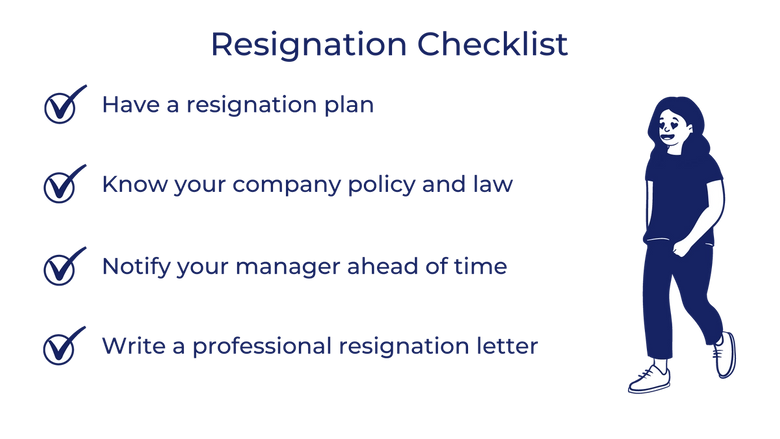Resignation letters: 3 things you must know before quitting
3 things you should absolutely think about before you go.
Considering leaving your current job to pursue a new opportunity? There’s more to resigning than simply making the decision, collecting your belongings, and bidding farewell. Once you’ve decided to leave, it is crucial that you have a resignation plan to maintain positive relationships with co-workers and protect yourself from any mishaps. Here, we’ve laid out the top things you must know to be prepared.
Know the law and company policy

First, it is important that you know the applicable laws and company policies. You should review your employment contract - if your employment is “at-will” (meaning both your employer and yourself can terminate the employment without any reason), you are not obligated to give advance notice. However, terminating your employment on very short notice may not be taken kindly by employers. For the best chance of maintaining a good relationship with them, provide advance notice even if you aren't required to.
Some employment contracts and company policy handbooks will specify that you must give a certain amount of notice, often two weeks. If a two weeks notice is required, you should plan to send in your letter of resignation two to three weeks in advance of your last day.
Write a resignation letter

Why write a resignation letter?
While you may not need to provide a formal resignation letter, it is still beneficial to do so for multiple reasons. First, providing a letter of resignation makes you seem professional and helps facilitate the transition for your company. Regardless of your reason for resigning, maintaining good terms with your old company and leaving on a positive note is important for getting future references, protecting your reputation in the industry, or even returning to the same company in the future. You do not want to close any doors for the future because of how you handled your resignation and departure.
Another key reason for writing a resignation letter is to ensure that you will be paid until your last day and safeguard yourself from potential issues. Sending in your resignation letter formally initiates the transition process. It also provides a paper trail in case your employer doesn’t pay you properly or other administrative issues arise.
Before writing a resignation letter...
Before you draft the resignation letter or even mention your resignation to others, it is key that you let your manager know and have a discussion with them. Your manager should learn about your resignation from you before anyone else. More than anything, you want to maintain trust with your manager and leave on good terms, as discussed above.
Resignation letter do’s and don’ts
Regardless of which resignation letter template you use, you should be mindful of the following best practices:
Resignation letter "Do"s
- Do include the basics: company name, your role, your last day of employment, your contact information (should they need to reach you for any reason)
- Do specify that the letter is your formal resignation
- Do keep it concise
- Do say thank you and end it on a high note
- Do keep a copy for your records, whether it's a hard copy or an email trail
Resignation letter "Don't"s
- Don’t be negative or complain about anyone (regardless of your views toward your company or your reason for resignation)
- Don’t use inappropriate, informal, or overly sentimental language
- Don't over-explain or include deeply personal reasons for your resignation
- Don’t have grammatical or spelling errors. Remember: your resignation letter will shape your company’s final impression of you
- Don’t include unnecessary information about your job search, new job, or future plans. While you may want to discuss these plans with your friends at work or your manager, you should leave out unnecessary information
- Don’t apologize. While you may feel sorry for leaving your company, this is not the appropriate place to express such feelings
Sample resignation letter
See below for a sample resignation letter. You should feel free to adjust it to fit your own circumstances and requirements.
Thank you
Dear [name of your manager, HR manager, or responsible party],
Please accept this letter as my formal resignation from my position as [job title] at [company name]. My last day will be [your preferred end date].
Thank you so much for the opportunity to be part of this incredible team for the past [amount of time you’ve been at the company]. I’ve learned tremendously from the opportunities to [several of your favorite achievements and job responsibilities]. I will take these valuable experiences with me throughout my career.
During my last [amount of time you have left at the company], I’ll do everything possible to wrap up my duties and train other team members to ensure a smooth transition. Please let me know if there’s anything else I can do to facilitate the process.
I look forward to following [company name]’s continued success, and I hope our paths will cross again.
Thank you.
Sincerely,
[Your Name]
[Your contact information]
Final takeaways

How you handle your resignation will shape your colleagues and manager’s final impression of you. Therefore, regardless of your reason for leaving your current company, it is essential that you have a resignation plan, including knowing the applicable law and your company policy, notifying your manager ahead of your resignation, and crafting a professional resignation letter that allows you to leave on the best terms. If you're stuck, use the resignation letter example above as a template.
The information provided herein is for general informational purposes only and is not intended to provide tax, legal, or investment advice and should not be construed as an offer to sell, a solicitation of an offer to buy, or a recommendation of any security by Candor, its employees and affiliates, or any third-party. Any expressions of opinion or assumptions are for illustrative purposes only and are subject to change without notice. Past performance is not a guarantee of future results and the opinions presented herein should not be viewed as an indicator of future performance. Investing in securities involves risk. Loss of principal is possible.
Third-party data has been obtained from sources we believe to be reliable; however, its accuracy, completeness, or reliability cannot be guaranteed. Candor does not receive compensation to promote or discuss any particular Company; however, Candor, its employees and affiliates, and/or its clients may hold positions in securities of the Companies discussed.
